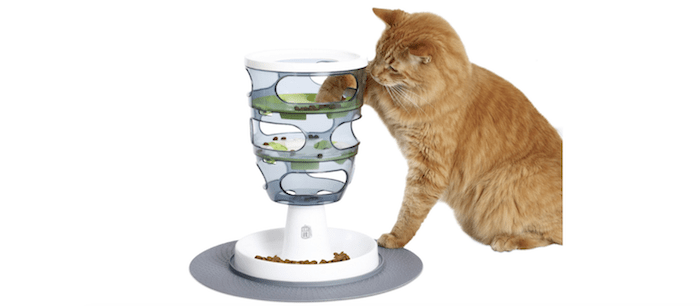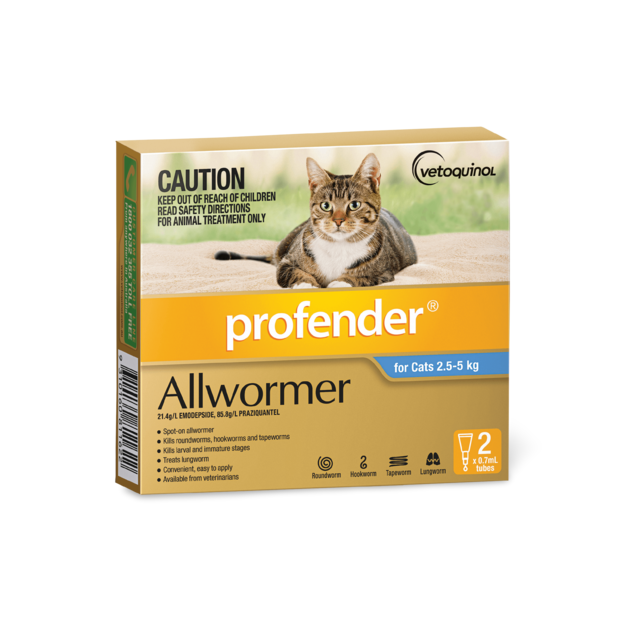Why is my cat vomiting?
This article is written by Pet Circle veterinarian,
Cat owners should be familiar with common conditions that can lead to vomiting. In some cases, your cat may not be vomiting, but regurgitating. In any case of persistent vomiting, ensure you consult your veterinarian and seek treatment if your cat appears unwell.
When to seek veterinary attention:
You should seek immediate veterinary attention if:
- Your cat is vomiting for more than 24 hours
- Your cat hasn't eaten or drank water for 24 hours
- Other symptoms are present such as diarrhoea, coughing or sneezing
- Your cat has lost weight
- Your cat has a pre-existing condition, such as kidney disease, diabetes or hyperthyroidism
- Worms are present in the vomitus
Contents
Eating something they shouldn't
Extra-intestinal (systemic) diseases
Hairballs

Hairballs arise due to fur being ingested during the grooming process. Usually this hair will pass out in the faeces, however when large clumps develop they may be regurgitated as a hairball.
Accumulated hair can also cause constipation - which in turn causes vomiting. In severe cases, a hairball can cause an intestinal blockage.
If hairballs are a recurrent problem for your cat, try switching to a hairball control cat food. Hairball diets contain a high fibre content which helps hair move through the digestive tract. Regular grooming is also important and helps to remove excess fur that would otherwise be ingested.
Want to learn more? Read our article Hairballs in cats.
Eating too quickly

Cats that gobble their food as soon as it hits the bowl may regurgitate straight after eating. The regurgitation occurs due to a stretch reflex being triggered in the stomach. The food will often be in a tube shape or will look like a pile of undigested food.
Using a food dispensing toy can really help slow down your kitty's food intake. As a bonus, this provides enrichment and mental stimulation for your cat too as they hunt for their dinner!
Top Puzzle Toys for cats
The flat, flexible mat allows food to be spread or sprinkled on the surface to encourage licking to retrieve the tasty treat!
The Wobbler dispensing tasty rewards as it wobbles, spins and rolls.
Featuring a fun maze enclosed in a plastic shell with teeny paw holes, this product is ideal for encouraging problem solving in cheeky cats.
Eating something they shouldn't

Household items like string, ribbons or hairbands may be ingested by cats during playtime. While the whole item may be vomited up, in some cases it may pass through from the stomach to the intestines and cause a life-threatening obstruction.
Human medications may be accidentally ingested by your cat. Cats are particularly susceptible to paracetamol toxicity. Common household plants such as lilies are also poisonous to cats. If you suspect your cat has consumed something they shouldn't, seek veterinary advice.
Lastly, while not as common as with dogs, some cats will scavenge and eat spoiled food, leading to an upset stomach and vomiting.
Food allergies

Food allergies can occur when cats develop an allergy to something present in their diet. This is most commonly a protein such as chicken, beef, dairy, fish, lamb, gluten and egg. You may see other symptoms, such as itchy skin or diarrhoea.
If you suspect that your cat may have a food allergy, consult your veterinarian. They may recommend a dietary trial using an elimination diet which is specifically formulated to be hypoallergenic. If the vomiting resolves during the feeding trial, it may indicate a food intolerance which usually requires a special dietary formulation to be fed long term.
Your veterinarian may recommend a dietary trial with either a novel protein or hydrolysed protein diet.
Top Hydrolysed Diets for Cats
Royal Canin Veterinary Anallergenic Cat Food

Anallergenic is made from highly hydrolysed protein sourced from chicken feathers. Due to the very small size of the protein and its novel origin it is extremely unlikely to trigger a food allergy or adverse reaction.
Z/d is made from a protein that has been hydrolysed, which means that it does not react with your pets allergy receptors.
Royal Canin Veterinary Hypoallergenic

Royal Canin Hypoallergenic is made from hydrolysed soy protein to reduce the risk of an adverse food reaction or allergy.
Internal Parasites

Intestinal parasites including roundworms and coccidia commonly infect cats and can cause vomiting. Most kittens are born with parasites, with roundworms being the most common, so routine deworming of kittens and cats is essential.
Ensure your cat is treated for parasites regularly, especially if they go outdoors. Many products offer protection from both fleas and most worms, such as Revolution Plus and Advocate.
Read more about feline parasite preventatives, and see a complete product comparison table, in our article Cat Guide to Parasite Preventatives in Australia.
Top Worming Products for Cats
Some indoor cats in temperate regions may not require flea or tick prevention, but heartworm and intestinal worming is still required. Milbemax is a great option for complete worming, and is a lovely small tablet!
Not to be confused with its sister product Bravecto, Bravecto Plus is a topical given every 2 months which protects your cat from ticks, fleas, heartworm, intestinal worms and ear mites.
Ideal for those tricky to tablet cats, Profender is an easy to use, spot-on treatment that treats and controls all major gastrointestinal worms of cats including roundworm, hookworm and tapeworm.
Intestinal Diseaase

If your cat has chronic vomiting that does not respond to symptomatic treatment, an underlying intestinal disease may be present. Inflammatory bowel disease and some cancers within the intestines can cause vomiting. Your vet may recommend blood tests, imaging and/or biopsies to investigate the cause of long-term vomiting in cats.
Top Diets for Cats with Sensitive Stomachs
Hills Prescription Diet Gastrointestinal Biome
Biome is formulated to be easily digested and contains additional prebiotics (fibre) to support the intestinal microbiome.
Royal Canin Veterinary Sensitivity Control

Sensitivity Control is formulated using chicken and rice, which are both easily digested, and uses prebiotics to help maintain healthy intestinal microflora.
I/d Digestive Care for cats is enriched with omega-3 fatty acids, which may have an anti inflammatory effect on the bowel.
Shop All Cat Sensitive Stomach Food
Extra-intestinal (systemic) Disease

Systemic diseases such as diabetes, hyperthyroidism, liver and kidney disease can all cause vomiting. Ensure you consult your veterinarian and seek treatment if your cat appears unwell.
Further Reading
Want to read more? Check out our other articles:



































